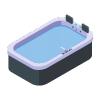Making a Splash: 9 Stunning Pool Options for Your Dream Home
Is there anything more refreshing than jumping into a cool pool on a sweltering day?
Instead of going to a crowded public pool, many families opt to add a pool to their backyard. Just think of the possibilities—a pool can be a place for children to play, for adults to relax with a refreshing drink, and for friends to gather and have fun.
It can also be a low-impact, refreshing way to get some exercise or wake yourself up in the morning!
But choosing the right pool can feel overwhelming. How big should the pool be? Will it fit in my yard? Should it be inground or above ground? Should I consider a chlorine alternative?
At Keystone Custom Decks, we build swimming pools to fit many tastes, needs, yard sizes, and budgets. We’d love to help you by walking through the pros and cons of nine different pool types!
Let’s get started.
1. Above-Ground Pools
The simplest and most affordable way to add a swimming pool to your backyard is to set up an above-ground pool.
An above-ground pool is a free-standing structure set up in a backyard and filled with water. It’s an alternative to the inground pool, which requires digging into the ground.
Here are the pros and cons of above-ground pools.
Pros of above-ground pools
- Above-ground pools are an affordable option.
- It’s relatively easy to install, disassemble, move, and re-assemble above-ground pools.
- Above-ground pools are generally smaller and more accessible for maintenance tasks than inground pools.
Cons of above-ground pools
- Above-ground pools have limited size and design options.
- Without the enveloping support of the ground, above-ground pools are more susceptible to damage and won’t last as long as inground pools.
- Above-ground pools don’t have the aesthetic appeal of other pool types.
Note: Above-ground pools are typically bought off the shelf, so here at Keystone, we don’t offer above-ground pool installation. However, we can build a custom deck around your above-ground pool, which makes it nicer to look at and more convenient to use!
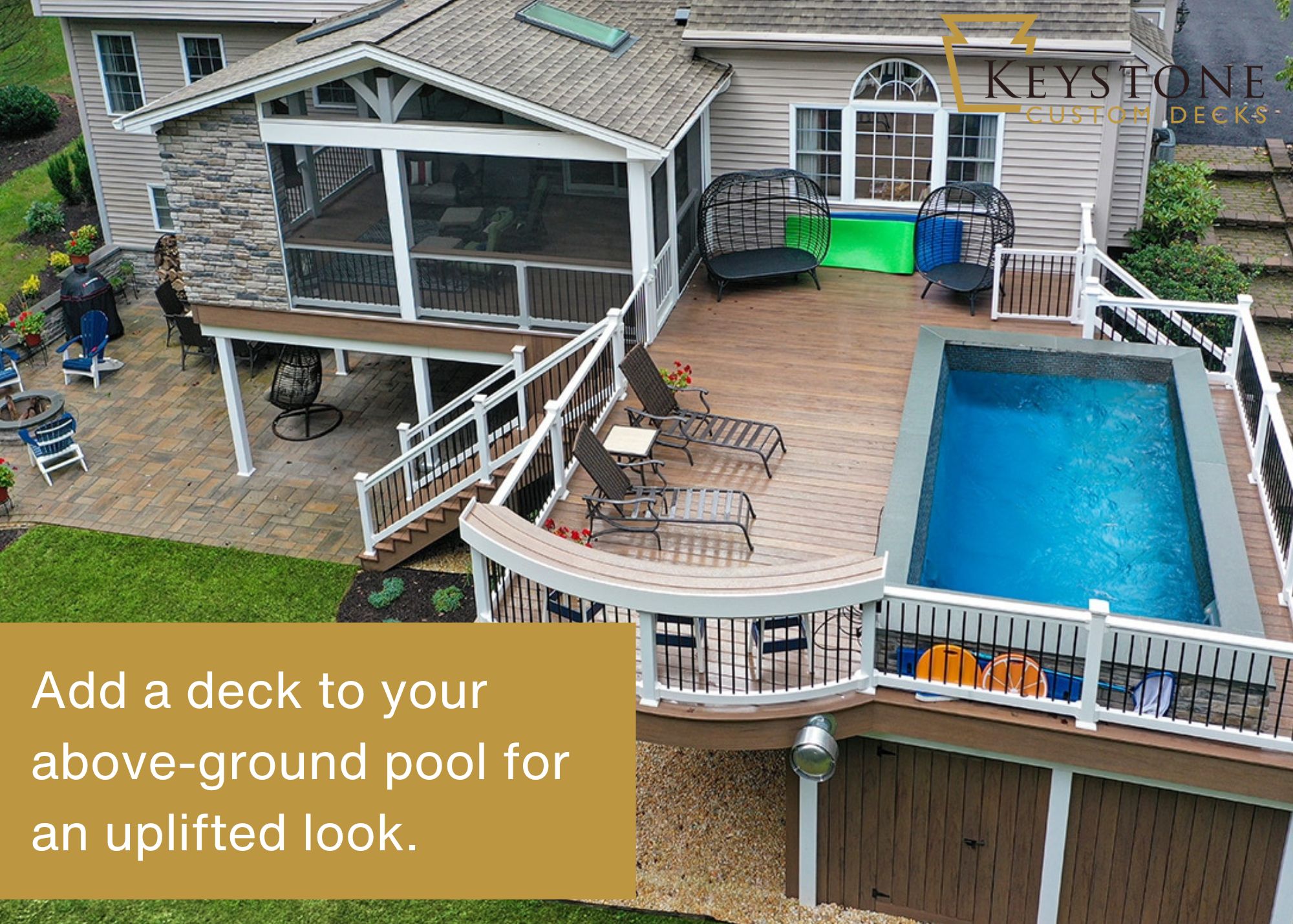
2. Inground Pools
The most popular pool type is the inground pool. Inground pools are created by excavating a hole in the ground and then pouring concrete or installing a pool structure. Inground pools are beautiful and highly customizable.
But like all pool types, inground pools have their pros and cons!
Pros of inground pools:
- Inground pools come with many size and design options and can be fully customized to create the pool of your dreams.
- Because they’re made with durable materials and are supported by the ground, inground pools last for a long time—sometimes for generations!
- A well-designed inground pool will increase your property value.
Cons of inground pools:
- Inground pools are considerably more expensive than other pool options.
- Inground pool installation is complicated and must be done by a reputable contractor.
- Maintaining and servicing an inground pool is a complex process.
If you’re interested in inground pools, you’ll enjoy reading this related blog post: Considering an Inground Pool? 7 Frequently Asked Questions Answered.
3. Semi-Inground Pools
Did you know there’s a pool option halfway between an inground and above-ground pool?
A semi-inground pool, also called a semi-above-ground pool, is a pool that sits partly in the ground. It’s made by excavating a shallow hole, installing a pool, and then building a retaining wall around the portion of the pool that sits above ground.
Pros of semi-inground pools
- Semi-inground pools are an excellent in-between option. If you want something nicer than an above-ground pool but less expensive than an inground pool, semi-inground may be the way to go.
- Semi-inground pools provide a convenient way to put a pool on a sloped yard or small hillside.
Cons of semi-inground pools
- Semi-inground pools have limited options compared to fully-inground pools.
- Since the ground needs to be excavated for your semi-inground pool, you won’t be able to set it up yourself or move it around like you can with an above-ground pool.
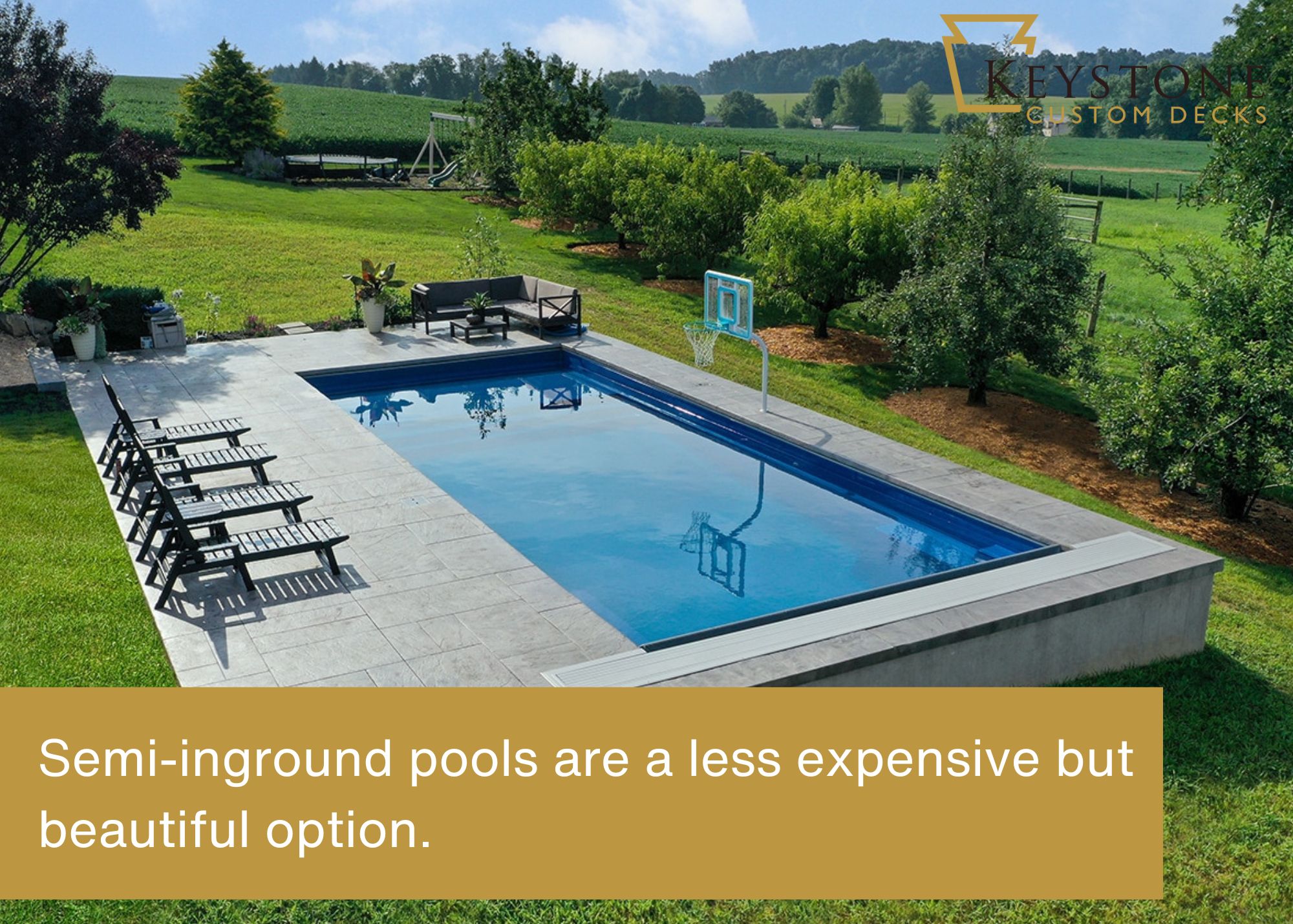
4. Infinity Pools
If you have a home with a view, either on a rooftop or hillside, you can take full advantage of it by creating an infinity pool with an edge that appears to vanish into the sky.
Here’s how an infinity pool works: The edge of the pool facing the view is built lower than the other edges, causing water to flow over it and into a catch basin. Since you can’t see the catch basin from the pool, it creates an illusion of a pool with no edge.
Pros of infinity pools
- Infinity pools are a relaxing way to take full advantage of a view.
- The aesthetic appeal of an infinity pool increases property value.
Cons of infinity pools
- Infinity pools aren’t for everyone; you need the right sort of home with a rooftop or hillside suitable for a pool.
- The catch basin mechanism adds extra expense and maintenance.
5. Swim Spas
Some people love warm water and would rather relax in a hot tub than in a pool. But while we typically use hot tubs for sitting and pools for swimming, there are hot tubs you can swim in!
Called “swim spas,” these structures are larger than a typical spa or hot tub but smaller than a traditional pool. In addition to hot water and jets, swim spas incorporate a propulsion system that allows you to swim in place against the current. It’s sort of like a treadmill for swimming!
Pros of swim spas
- Since swim spas allow you to swim in place, you can swim for as long as you like without reaching a wall and having to turn around.
- Swim spas are great for small spaces since they’re much more compact than other pools.
- If you want to relax with friends, a swim spa holds many more people than a typical hot tub or spa.
Cons of swim spas
- Although one person can swim in a swim spa, there isn’t enough space for multiple swimmers, playing pool games, or other traditional pool activities like diving.
- Swim spas won’t give you the customization or visual appeal of an inground pool.
6. Lap Pools
Lap pools are long, narrow pools designed for swimming laps. They’re an excellent option for anyone who primarily wants a pool for exercise. They also work well in narrow lots or spaces which otherwise would be challenging to utilize.
Pros of lap pools
- A lap pool is an ideal option for someone who loves to swim for exercise.
- Lap pools fit into spaces where a traditional pool would never fit, such as a narrow residential lot.
- Lap pools are beautiful! Although they’re functionally exercise equipment, with a good design, they’ll also elevate the overall look of your backyard.
Cons of lap pools
- The narrow shape of a lap pool may restrict some traditional pool activities and limit how many people can use it at once.
- Although lap pools are beautiful, they have a long, narrow, minimalist design that may not suit your taste.
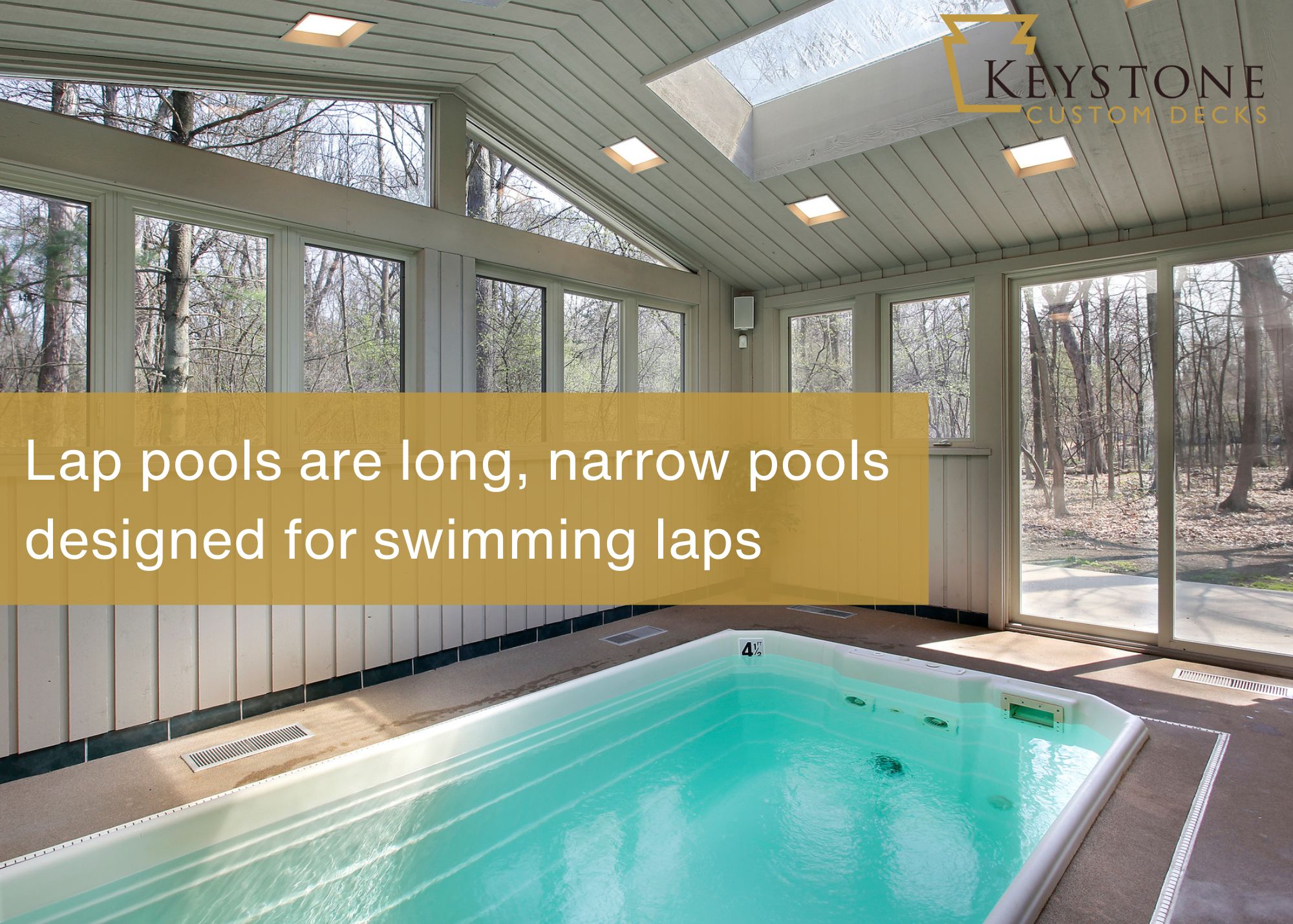
7. Plunge Pools
If you love jumping into a cool pool but don’t have the space for a large, traditional pool, a plunge pool might be for you!
A “plunge pool” refers to any small pool just big enough for a quick plunge. It comes in above-ground, inground, and semi-inground options and provides just enough space for a couple of people to relax, cool off, and splash around.
Pros of plunge pools
- Plunge pools are fantastic for fitting into small spaces.
- Plunge pools are an affordable pool option.
- Frankly, plunge pools are cute! The right plunge pool will enhance your space and provide a fun spot to cool off.
Cons of plunge pools
- Plunge pools are too small for most pool activities, including swimming.
- Only a few people can use a plunge pool at one time.
Remember: No matter the size of your pool, you can make the most of the feature by adding a nice deck around it! For more information, read our Top 7 Pool Deck Ideas.
8. Saltwater Pools
Most pools rely on chlorine to keep the water clean and clear. But more and more, people are looking for alternatives to the harsh traditional chlorine that irritates your eyes and skin and leaves a chemical smell on your bathing suit.
One alternative to the chlorine pool is the saltwater pool. Saltwater pools contain dissolved salt and use a salt-chlorine generator to convert the salt to a gentler level of chlorine that disinfects the water without feeling so harsh.
Pros of saltwater pools
- Once installed, saltwater pools regulate their own chlorine levels, which means less maintenance for you (and, given enough time, less cost).
- The water in saltwater pools feels better on the skin and gentler overall than in traditional chlorine pools.
Cons of saltwater pools
- Saltwater pools have a much higher upfront cost. A saltwater system can cost up to $2,500, whereas you can get a chlorine system for a few hundred dollars.
- Saltwater systems require expert installation and maintenance.
- The salt in the water may damage pool components or the surrounding landscape if not appropriately handled.
Note: Many people imagine saltwater pools will feel like swimming in the ocean. Actually, saltwater pools contain ten times less salt than the ocean.
9. Natural Pools
Do we need chlorine at all? Nature contains sparklingly clear rivers and lakes without the help of any harsh chemicals. Can’t we replicate that effect in our backyards?
We can!
Natural pools are backyard pools with biological filtration systems. They’re created to look like ponds and contain two chambers: an area for swimming and a separate “regeneration zone” where aquatic plants and beneficial microorganisms clean the water naturally.
Pros of natural pools
- If chemical-free swimming is important to you, natural pools are your best option.
- Natural pools are gorgeous and blend seamlessly into nature.
- Maintaining a natural pool may be a fun hobby if you enjoy gardening and tinkering with biodiversity and plant life.
Cons of natural pools
- Natural pools have a high upfront cost due to their complexity and rarity.
- Although natural pools have clean, clear water, they don’t have the same pristine, crystal-clear look as chlorine pools. This may be off-putting for some people.
- Because of the two chambers, natural pools require a great deal of space.
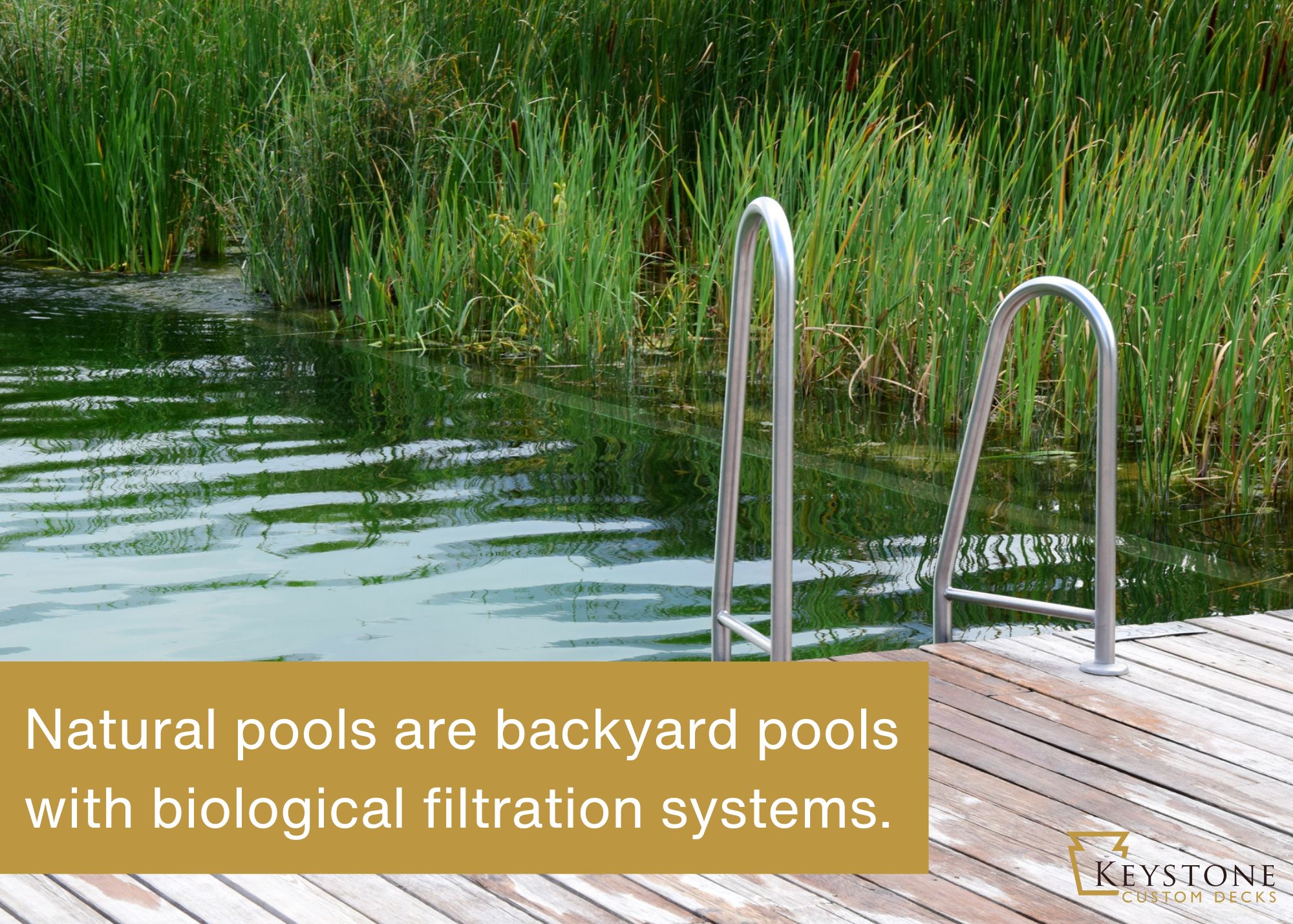
How Keystone Custom Decks Can Make Your Dream Pool a Reality
Whether you’re looking for something large or small, simple or extravagant, natural or traditional, there’s a pool option that’s right for you.
Here at Keystone Custom Decks, we’d love to help make your dream pool a reality! We build custom swimming pools to suit your needs and give you the pool of your dreams.
We also make:
Whatever your dream outdoor living space looks like, Keystone can help you accomplish it!
Contact us today if you would like to have a meaningful conversation about your vision.





